The company on Tuesday, April 16, 2024 announced a further reduction of the price of diesel from N1,200 to N1,000 per litre.
While rolling out the products three weeks ago, the refinery supplied at N1,200 per litre, representing over 30 per cent reduction from the previous market price of about N1,600 per litre.
The refinery stated that “this significant reduction in the price of diesel, at Dangote Petroleum Refinery, is expected to positively affect all the spheres of the economy and ultimately reduce the high inflation rate in the country.”
The management of Dangote Petroleum Refinery had earlier registered the Depot and Petroleum Products Marketers Association of Nigeria (DAPPMAN), the Independent Petroleum Marketers Association of Nigeria (IPMAN), and the Major Oil Marketers Association of Nigeria (MOMAN) for the lifting and distribution of refined petroleum products across the country.
The company stated that it is also considering other marketers that have signified interest in the lifting and distribution of its petroleum products in the country.
The 650,000 barrels per day Dangote Petroleum Refinery can process most African crude grades as well as Middle Eastern Arab Light and even US Light tight oil as well as crude from other countries.
Dangote Petroleum Refinery can meet 100% of Nigeria’s requirement of all refined products, gasoline, diesel, kerosene, and aviation jet, and also have surplus of each of these products for export.
The refinery was built to take crude through its two SPMs located 25 kilometres from the shore and to discharge petroleum products through three separate SPMs. In addition, the refinery has the capacity to load 2,900 trucks a day at its truck-loading gantries.
Dangote Refinery has a self-sufficient marine facility with the ability to handle the largest vessel globally available. In addition, all products from the refinery will conform to Euro V specifications.
The refinery is designed to comply with US EPA, European emission norms, and Department of Petroleum Resources (DPR) emission/effluent norms as well as African Refiners and Distribution Association (ARDA) standards.

